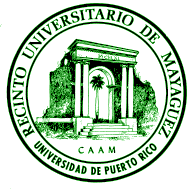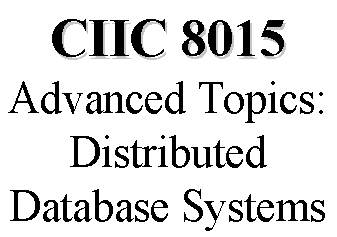

| Overview |
| Announcements |
| Syllabus |
| Lectures |
| Projects |
| Exams |
| Laboratory |
| E-mails |
Syllabus for CIIC 8015:
Distributed Database Management Systems
1 Faculty
Dr. Manuel Rodríguez-Martínez
Office: T-212
Phone: (787)-832-4040, x-3023
E-mail: manuelr@acm.org
Office Hours: TBA
2 Course Description
A contemporary look at field on Distributed Database Management Systems, focusing on techniques, trends and open problems that are currently shaping the research agenda for the next few years. Study of Distributed Database Architectures, Query Processing Algorithms, Distributed Transaction Models, Replication and Caching Algorithms, World-Wide Web and Databases, and Data Dissemination. The list of concrete topics includes: Internet Architecture, Client-Server Architectures, Peer-to-Peer Architectures, Wide-Area Information Systems, Heterogeneous Database Systems, Middleware Architectures, Mobile Databases, Data Dissemination and Broadcasting, Distributed Transactions, Replication, Caching, World Wide Web Architectures, Distributed View Materialization, Distributed Query Processing, Networks of Sensors, and Earth Science Information Systems.
NOTE: This is an advanced graduate-level course, with a strong emphasis on research problems. Our goal is to get a better understanding of design and implementation issues for next-generation Distributed Database Management Systems. This is NOT a course intended to teach you how to use any particular software tool or system. It is expected that you can do this by yourself, or with the help of your project partners.
3 Pre-requisites
An introductory course to Database Management Systems that is equivalent to ICOM 4017. Students with ICOM 6005 might have a more solid foundation. Also, students are expected to be proficient with a modern programming language such as C, C++ or Java. Experience with a Database Management System (e.g. ORACLE), JDBC, ODBC, Windows 2000 or UNIX is a plus.
4 Time and Place
Tuesdays and Thursdays, 4:30 PM – 5:50 PM, S-203 (S-227)
5 Course Credits
3 credits
6 Class Web Page
http://www.ece.uprm.edu/manuel/class/spring02/ciic8015/index.htm
7 Textbook
There is no required textbook for the class. Instead, we will read a considerable amount of journal and conference research papers, published in the major forums for Database research. These papers will be made available to you on-line via the class Web Page. Similarly, the reading list indicating the papers to be read will be made available later on. In addition, several chapters from Database textbooks will be made available as needed. These copies will be placed at the Engineering Reproduction Center.
The following is a tentative list of the books from which selected chapters will be obtained:
Database Management Systems, 2nd ed.
Raghu Ramakrishnan and Johannes Gehrke
McGraw-Hill, 2000
ISBN: 0-07-232206-3
Databases and Transaction Processing: An Application-Oriented Approach
Philip M. Lewis, Arthur Bernstein, and Michael Kifer
Addison-Wesley, 2002
ISBN: 0-201-70872-8
Database System Concepts, 2nd ed.
Henry F. Korth and Abraham Silberschatz
McGraw-Hill, 1991
ISBN: 0-07-044754-3
TCP/IP Illustrated, Vol. 1
W. Richard Stevens
Addison-Wesley, 1994
ISBN: 0-201-63346-9
8 Grading
Your grade will be based exclusively on the scores that you obtain in the class term project, quizzes, short papers assignments and class participation. The curve to be used to assign a grade to your score will be as follows:
GradeScore (%)
100-90 A
89.9-80 B
79.9-70 C
69.9-65 D
65.0-0 F
Your total score will be calculated from your individual scores in the project, quizzes, short papers assignments and class participation. The weights assigned to each of these categories are as follows:
Term Project 50%
Quizes 15%
Short Papers 25%
Class Participation 10%
9 Term Project
In this course, you are expected to complete a mini-research term project on a topic of your choosing. You can work individually, but it is preferred that you work in teams of two or three students. The professor will suggest several topics, or you might propose you own. The only requirement for the topic is that it is relevant to the area of Distributed Databases. You must e-mail the professor your topic before starting with the project. Every project should be completed using the academic and/or research facilities available from the ECE Department at UPRM.
10 Quizzes
We will have several 15-minutes quizzes at the beginning of the class period. These quizzes will be announced, and will consist of either one discussion question, or one problem. The quizzes will be based on the material already discussed in the class, or on material to be discussed the on day of the quiz.
11 Short Papers
Each student will write several 2-page papers explaining the main ideas and contributions of some papers that will be discussed in the class. The first few papers will be written in Spanish, to get you comfortable with the writing process. Later on, however, they must be written in English to get you experienced in technical writing, a skill required to publish good research papers.
12 Academic Integrity
Each student is expected to work individually on all quizzes and short papers. Students can only collaborate in their project with the other members of their team. You may not use code from another student who is not a member of your team, or use code that you find on the Internet or any similar resources, unless the latter is a tool, system, or API that you plan to use or modify as part of your project. You may not share your code with another student who is not a member of your team. Failure to comply with these requirements will result in a grade of F in the course for the student(s) breaking these rules. Unauthorized group efforts, particularly during quizzes, will be considered academic dishonesty and the students involved will receive an F in the course. You should read Article 10 of the "Reglamento General de Estudiantes de la Universidad de Puerto Rico" to learn more about the possible sanctions that you might experience if caught in an act of academic dishonesty
© 2002 University of Puerto Rico-Mayaguez. All rights reserved.